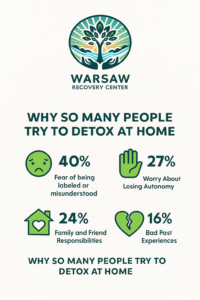If you’re thinking about quitting drugs or alcohol on your own, you’re not alone. For many people, the idea of walking into a treatment center can feel overwhelming—especially if this is your first time even considering it.
Maybe you’re nervous about being judged. Maybe you’re afraid of losing your freedom, or you’re not sure what treatment actually involves. Or maybe you’ve just been white-knuckling it for so long that you figured, “I’ll just do it at home.”
We understand. At Warsaw Recovery Center in Virginia, we’ve helped many people in this exact place. They weren’t weak. They weren’t dramatic. They were trying their best to solve something very real on their own—until it got too hard or too dangerous.
That’s why this conversation matters. Because detoxing alone isn’t just tough—it can be unsafe. And there’s another option that puts safety, dignity, and choice at the center: a medical detox program.
Why So Many People Try to Detox at Home
If you’ve been considering going it alone, it’s not because you don’t care. It’s often the opposite.
Here are some common (and very human) reasons people try to detox at home:
- Fear of being labeled or misunderstood. Stigma around addiction and treatment can be incredibly isolating.
- Worry about losing autonomy. Many people think entering a facility means giving up their freedom or being forced into a long-term program.
- Concern about responsibilities. Parents, caregivers, and professionals often fear stepping away from work or family, even temporarily.
- Bad past experiences. If someone’s had a negative encounter with the medical system or treatment in the past, trust takes time.
- Minimizing the risk. Sometimes it feels like “just getting through withdrawal” is something you should be able to handle.
These are real concerns. And we honor them. But we also want you to have the full picture.
The Real Risks of Detoxing Alone
Withdrawal isn’t just a rough few days—it’s a serious medical event. And when it’s unmanaged, it can spiral quickly.
Here’s what makes unsupervised detox dangerous:
- Seizures. Especially with alcohol, benzodiazepines, or barbiturates, seizures can come on suddenly and without warning.
- Heart complications. High blood pressure, arrhythmias, or cardiac arrest are possible when the body is under stress.
- Dehydration and malnutrition. Nausea, vomiting, and lack of appetite can lead to serious imbalances.
- Mental health emergencies. Hallucinations, panic, suicidal ideation—these are real possibilities during withdrawal.
- Relapse risk. Intense discomfort often leads to resuming use just to get relief, which can increase overdose risk due to lowered tolerance.
Even if none of that happens, detoxing alone can still leave you physically and emotionally depleted, with no follow-up support. It’s like performing surgery without a sterile environment or recovery plan.
What a Medical Detox Program Really Looks Like
Let’s clear something up: medical detox doesn’t mean being trapped in a hospital room with strangers. At Warsaw Recovery Center, it means walking into a space where your safety is the priority—and where your voice matters.
Here’s what to expect:
- A warm welcome. No judgment, no pressure—just a team ready to meet you where you are.
- Assessment and clarity. We’ll talk through your substance use history, physical health, and goals to tailor the right detox approach for you.
- 24/7 medical monitoring. Nurses and clinicians are present around the clock to support you, adjust medications, and respond quickly to any changes.
- Comfort-first care. We use evidence-based protocols to minimize withdrawal symptoms safely.
- Your own pace. Detox is the beginning—not the whole picture. And we never pressure you into the next step.
It’s not just about getting substances out of your body. It’s about doing it safely, with dignity, and with support.
Key Safety Protocols That Protect Your Body
Medical detox is not a cookie-cutter process. Every body—and every brain—responds differently to withdrawal. That’s why we start with a full health evaluation and continue monitoring every step of the way.
Our safety-first approach includes:
- Withdrawal medications when needed. These are prescribed and adjusted by licensed professionals based on your specific needs.
- Vitals monitoring. Heart rate, blood pressure, oxygen levels—all tracked to prevent complications.
- Hydration and nutrition support. Even when your appetite disappears, your body still needs care.
- Sleep and rest protocols. We help you get the rest your body needs to recover.
- Emergency readiness. If anything unexpected arises, we’re prepared. You’re not alone with symptoms—you’re supported through them.
These aren’t luxuries. They’re lifesaving standards of care.
Emotional Support You Don’t Expect (But Need)
Detox can be a floodgate.
When substances leave the system, so do the emotional buffers that kept certain feelings numbed or buried. It’s not uncommon to feel:
- Overwhelmed by emotion
- Grief about the past
- Anxiety about what comes next
- Relief—and fear—at the same time
You don’t have to navigate that alone. Our staff are trained to help you not only through the physical process of detox, but also the emotional complexity it brings.
We respect that you’re not just a “case” or a “diagnosis.” You’re a whole person with a history, fears, and hopes. That deserves more than a cot and a clipboard. It deserves care that sees you.
Wondering If Medical Detox Is Right for You?
Here’s the truth: if you’ve been using substances regularly and feel anxious, sick, or off when you try to stop—your body may be dependent.
That doesn’t mean you’re broken. It means your system has adapted, and it needs help to reset safely.
Medical detox might be right for you if:
- You’ve experienced withdrawal symptoms before (shaking, nausea, anxiety, seizures)
- You use substances daily or in large amounts
- You’ve tried to quit but couldn’t tolerate the symptoms
- You’re worried about doing it alone
Even if you’re not sure, it’s okay to ask questions. Our team can walk you through the options, explain the risks, and help you decide—without pressure or obligation.
Frequently Asked Questions About Medical Detox
Is medical detox only for people with “serious” addictions?
Not at all. If your body has developed physical dependence—even if your use doesn’t look “extreme”—detox can be medically necessary. We care about your safety, not labels.
Will I be forced to stay in treatment after detox?
No. We’ll talk with you about next steps, but the choice is yours. Our goal is to keep you safe and supported—whether you continue with us or need help finding another path.
How long does detox take?
It varies. Most detox programs last between 5 to 10 days depending on the substance, duration of use, and your health. We’ll assess your needs carefully and adjust as needed.
What happens after detox?
We offer continued care planning, including residential treatment or outpatient programs if you choose. But again—this is your path. You’ll never be forced into anything you’re not ready for.
Ready to Talk?
You don’t have to white-knuckle this on your own. Call (888) 511-9480 to speak with someone who understands. Or learn more about our medical detox program in Warsaw, Virginia.


